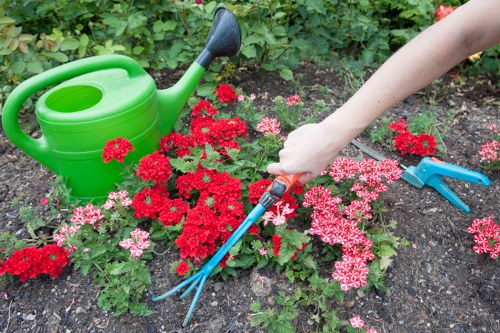Lawn Mowing in Forest Hill: Achieve a Pristine Yard All Year Round

Maintaining a lush, green lawn is a goal many homeowners in Forest Hill strive to achieve. A well-mowed lawn not only enhances the curb appeal of your property but also provides a pleasant space for outdoor activities and relaxation. Whether you opt for regular DIY mowing or decide to hire professional services, understanding the essentials of lawn mowing in Forest Hill is key to achieving the best results.
Forest Hill’s climate and soil conditions require specific lawn care practices to ensure your grass remains healthy and vibrant. From selecting the right type of mower to following proper mowing techniques, each decision impacts the overall health and appearance of your lawn. This comprehensive guide will walk you through everything you need to know about lawn mowing in Forest Hill.
One of the first steps in effective lawn maintenance is choosing the appropriate equipment. The type of mower you select can significantly influence the efficiency and quality of your mowing. Whether you prefer a push mower, a self-propelled model, or a ride-on mower depends on the size of your lawn and your personal preferences.

The Importance of Regular Lawn Mowing
Regular lawn mowing is fundamental to maintaining a healthy and attractive yard. It helps control the growth of grass, preventing it from becoming overgrown and promoting thicker, healthier grass. By cutting the grass at the recommended height, you encourage the roots to grow deeper, enhancing the lawn’s resilience against pests, diseases, and drought.
Consistent mowing also plays a critical role in weed control. By maintaining a uniform grass height, you reduce the chances of weed seeds taking root. Weeds often thrive in environments where grass is too tall or unevenly cut, so regular mowing helps keep your lawn free from unwanted vegetation.
Furthermore, a regularly mowed lawn contributes to better air circulation and sunlight penetration, which are essential for grass health. Proper airflow reduces the risk of fungal diseases, while adequate sunlight ensures photosynthesis occurs efficiently, leading to greener and more robust grass.

Benefits of a Well-Mowed Lawn
A meticulously maintained lawn offers numerous benefits beyond aesthetic appeal. It can significantly increase the property value, making it an attractive feature for potential buyers. A lush green lawn creates a welcoming first impression and demonstrates that the property has been well cared for.
Additionally, a healthy lawn provides a safe and enjoyable environment for family activities. It offers a soft surface for children to play and for outdoor gatherings with friends and neighbors. A well-mowed lawn also serves as a habitat for beneficial insects and wildlife, contributing to the local ecosystem.
From an environmental perspective, a healthy lawn acts as a natural air purifier, absorbing carbon dioxide and releasing oxygen. It also helps in reducing soil erosion and improving water retention in the ground, which are crucial for sustainable landscaping practices.

Choosing the Right Lawn Mower
Types of Lawn Mowers
Selecting the appropriate lawn mower is essential for efficient and effective lawn maintenance. There are several types of mowers available, each suited to different lawn sizes and user preferences:
- Push Mowers: Ideal for small to medium-sized lawns, push mowers are lightweight and easy to maneuver.
- Self-Propelled Mowers: These mowers reduce the effort required by propelling the machine forward, making them suitable for larger lawns or uneven terrain.
- Riding Mowers: Best for expansive lawns, riding mowers offer comfort and efficiency, allowing you to cover large areas quickly.
- Electric vs. Gas-Powered Mowers: Electric mowers are quieter and more environmentally friendly, while gas-powered mowers typically offer more power and longer run times.
Factors to Consider
When choosing a mower, consider the following factors to ensure it meets your lawn care needs:
- Lawn Size: Larger lawns may benefit from the efficiency of a riding mower, while smaller lawns can be managed with a push or self-propelled model.
- Terrain: If your lawn has uneven ground or slopes, a self-propelled mower can provide better control and ease of use.
- Grass Type: Different grass types have varying cutting height requirements, so ensure your mower can accommodate the specific needs of your lawn.
- Maintenance: Gas-powered mowers generally require more maintenance compared to electric models, so factor in the time and effort you're willing to invest.

Lawn Mowing Services in Forest Hill
Professional vs. DIY Mowing
Deciding between hiring professional lawn mowing services or managing the task yourself depends on various factors, including time, budget, and expertise. Professional services offer several advantages, such as consistent results, access to high-quality equipment, and expertise in handling different lawn conditions.
On the other hand, DIY mowing can be more cost-effective and allows for greater control over the mowing schedule and techniques. However, it requires investing in the right equipment and dedicating time to regular maintenance.
Choosing a Reliable Service Provider
When selecting a lawn mowing service in Forest Hill, consider the following tips to ensure you hire a reputable and reliable provider:
- Experience and Reputation: Look for companies with a proven track record and positive reviews from satisfied customers.
- Services Offered: Ensure the service provider offers comprehensive lawn care services tailored to your specific needs.
- Pricing: Compare quotes from multiple providers to find a service that fits your budget without compromising on quality.
- Insurance and Licensing: Verify that the company is properly insured and licensed to protect yourself from potential liabilities.
Seasonal Lawn Care Tips
Maintaining a healthy lawn requires adapting your mowing practices to the changing seasons. Each season presents unique challenges and opportunities for lawn care:
Spring
Spring is a critical time for lawn care in Forest Hill. As the weather warms, grass begins to grow rapidly, and regular mowing helps establish a strong foundation. It's also an ideal time to fertilize and aerate your lawn to promote healthy growth.
Summer
During the summer months, it's essential to mow your lawn at a higher height to provide shade for the roots and retain moisture. Additionally, ensure your lawn receives adequate water to combat the heat and prevent stress.
Fall
Fall is the perfect time to prepare your lawn for the upcoming winter. Reduce mowing frequency as grass growth slows and apply a fall fertilizer to strengthen the grass for the cold months ahead.
Winter
In winter, mowing activity decreases as grass enters a dormant phase. However, it's important to clear debris from your lawn and ensure your mower is properly maintained for the next mowing season.
Environmental Considerations
In Forest Hill, environmental sustainability is increasingly important in lawn care practices. Adopting eco-friendly mowing techniques can reduce your environmental footprint and contribute to a healthier ecosystem.
Eco-Friendly Mowing Practices
- Grasscycling: Leave the grass clippings on the lawn after mowing to decompose naturally, providing nutrients and reducing the need for additional fertilizers.
- Energy-Efficient Mowers: Choose electric or battery-powered mowers over gas-powered models to minimize emissions and reduce noise pollution.
- Proper Mowing Height: Maintaining the correct mowing height enhances grass density, which can outcompete weeds and reduce the need for chemical treatments.
Water Conservation
Efficient water use is crucial for sustainable lawn care. Implementing smart irrigation practices, such as watering early in the morning or late in the evening, can reduce water evaporation and ensure your lawn receives adequate moisture without wastage.
Maintenance of Your Lawn Mower
Proper maintenance of your lawn mower ensures its longevity and optimal performance. Regular upkeep can prevent breakdowns, enhance mowing efficiency, and extend the life of the equipment.
Routine Maintenance Tasks
- Blade Sharpening: Keep mower blades sharp to ensure clean cuts, which promote healthy grass growth and reduce the risk of disease.
- Engine Care: For gas-powered mowers, regularly check the engine oil and replace it as needed. Clean or replace air filters to maintain engine efficiency.
- Battery Maintenance: For electric mowers, ensure the battery is charged and stored properly to extend its lifespan.
- Cleanliness: Remove grass clippings and debris from the mower after each use to prevent rust and maintain performance.
Storage Tips
Storing your mower correctly can prevent damage and ensure it’s ready for use when needed. Store your mower in a dry, sheltered area away from extreme temperatures. For gas-powered mowers, drain the fuel or use a fuel stabilizer to prevent engine issues during storage.
Tips for a Healthy Lawn
Achieving and maintaining a healthy lawn involves more than just regular mowing. Incorporating various lawn care practices can enhance the overall health and appearance of your grass.
Proper Mowing Techniques
- Mow Regularly: Avoid cutting more than one-third of the grass blade at a time to prevent stress and promote healthy growth.
- Vary Mowing Patterns: Change your mowing direction each time to prevent grass from leaning and ensure even growth.
- Maintain Mower Height: Adjust the mower to the appropriate height for your grass type to support optimal growth conditions.
Fertilization and Aeration
Fertilizing your lawn provides essential nutrients that support grass health and growth. Aeration, the process of perforating the soil to allow air, water, and nutrients to penetrate the roots, is equally important for preventing soil compaction and promoting a robust root system.
Common Lawn Mowing Mistakes to Avoid
Avoiding common mistakes can significantly improve the health and appearance of your lawn. Being aware of these pitfalls helps ensure that your mowing practices contribute positively to your lawn’s well-being.
Cutting Too Short
Mowing your lawn too short can stress the grass, making it more susceptible to weeds, pests, and diseases. It also diminishes the lawn’s ability to retain moisture, leading to a dry and unhealthy appearance.
Ignoring Lawn Health
Failing to address underlying lawn health issues, such as soil quality or pest infestations, can undermine your mowing efforts. Regularly assess your lawn’s condition and take corrective actions as needed.
Mowing When Wet
Mowing a wet lawn can lead to uneven cuts, clumping of grass, and potential damage to the mower. It also increases the risk of spreading diseases that thrive in moist conditions.
Cost Factors and Budgeting for Lawn Care
Understanding the cost factors associated with lawn mowing and care can help you budget effectively and make informed decisions about maintaining your lawn.
DIY Costs
- Equipment Purchase: Initial investment in a quality lawn mower and other necessary tools.
- Maintenance Expenses: Ongoing costs for fuel, electricity, and replacement parts.
- Time Investment: Consider the value of the time you’ll dedicate to mowing and maintaining your lawn.
Professional Service Costs
Hiring professional lawn mowing services involves different cost considerations, including:
- Service Fees: Charges based on lawn size, frequency of mowing, and additional services like fertilization or aeration.
- Equipment Usage: Professionals typically use high-quality equipment, which can enhance the results but may influence the overall cost.
- Expertise: Paying for the knowledge and experience of lawn care specialists ensures that your lawn receives optimal care.
Budgeting Tips
To effectively manage your lawn care budget, consider the following tips:
- Assess Your Needs: Determine the services you require and prioritize based on your lawn’s condition and your personal preferences.
- Get Multiple Quotes: Compare prices from different service providers to find the best value for your budget.
- Plan for Seasonal Care: Allocate funds for seasonal tasks like fertilization, aeration, and pest control to ensure year-round lawn health.
Conclusion
Achieving a beautiful and healthy lawn in Forest Hill requires a combination of the right tools, techniques, and consistent care. Whether you choose to mow your lawn yourself or hire professionals, understanding the unique challenges and opportunities presented by Forest Hill’s environment is essential for success.
By following the tips and best practices outlined in this guide, you can maintain a lawn that not only enhances the beauty of your property but also provides a welcoming space for enjoyment and relaxation throughout the year.
Contact us today to book your lawn mowing service and take the first step towards a greener, healthier lawn!